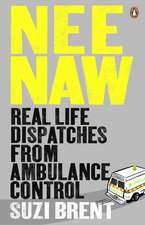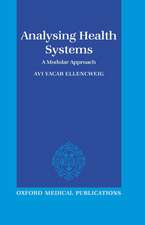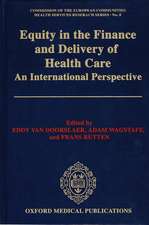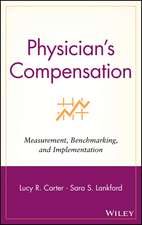Innovative Thinking in Risk, Crisis, and Disaster Management
Editat de Simon Bennetten Limba Engleză Hardback – 28 apr 2012
Dealing with issues of civil safety and security, the book addresses the management of socio-technical risks and hazards, environmental risk, and risk perception. Focusing on risk reduction, chapters cover key themes such as terrorism, public order, emergency responding, energy supply, climate change, and natural disasters.
Featuring contributions from expert scholars, the book is both accessible and original. Practitioners in the emergency services, industry and commerce will find the book to be valuable reading, whilst for policy makers, students and academics with a focus on risk and crisis management, this is an essential reference.
| Toate formatele și edițiile | Preț | Express |
|---|---|---|
| Paperback (1) | 324.16 lei 6-8 săpt. | |
| Taylor & Francis – 11 oct 2016 | 324.16 lei 6-8 săpt. | |
| Hardback (1) | 825.21 lei 6-8 săpt. | |
| Taylor & Francis – 28 apr 2012 | 825.21 lei 6-8 săpt. |
Preț: 825.21 lei
Preț vechi: 1143.59 lei
-28% Nou
Puncte Express: 1238
Preț estimativ în valută:
157.95€ • 171.63$ • 132.77£
157.95€ • 171.63$ • 132.77£
Carte tipărită la comandă
Livrare economică 21 aprilie-05 mai
Preluare comenzi: 021 569.72.76
Specificații
ISBN-13: 9781409411949
ISBN-10: 140941194X
Pagini: 288
Ilustrații: Includes 10 b&w illustrations
Dimensiuni: 174 x 246 x 15 mm
Greutate: 0.75 kg
Ediția:New ed
Editura: Taylor & Francis
Colecția Routledge
Locul publicării:Oxford, United Kingdom
ISBN-10: 140941194X
Pagini: 288
Ilustrații: Includes 10 b&w illustrations
Dimensiuni: 174 x 246 x 15 mm
Greutate: 0.75 kg
Ediția:New ed
Editura: Taylor & Francis
Colecția Routledge
Locul publicării:Oxford, United Kingdom
Notă biografică
Dr Simon Bennett is the Director of the Civil Safety and Security Unit at the University of Leicester, UK. After ten years in IT management, Simon obtained a PhD in the sociology of scientific knowledge. He also has a BA in Public Administration and an MA in Communications and Technology. Simon has worked as a consultant to both the aviation and rail industries and sits on the Editorial Board for the journal Risk Management. He edits the Vaughan College (University of Leicester) series of monographs and is the author of A Sociology of Commercial Flight Crew. His latest publication, The Pilot Lifestyle: A Sociological Study of the Commercial Pilot's Work and Home Life, is the product of a six-month research contract for the British Air Line Pilots' Association.
Recenzii
'This collection is a significant contribution to the literature on risks and disasters in contemporary societies and how to manage them. It is a rich source of new ideas for academics, students, policymakers and practitioners. Written in an accessible style, the book is wide in scope and fertile with ideas. It is timely and challenging and provides new insights and understanding.'
John Benyon, Professor, University of Leicester, UK and Chair, College of Learned Societies, Academy of Social Sciences
'This book offers genuinely original thinking that will be of interest to academics as well as practitioners in the emergency services and policy makers. Overall, it is an optimistic book which says that the problems we face in the 21st century are not intractable: what is needed is a little less dogma and a little more imagination. A sentiment with which many can agree.’
The ROSPA Occupational Safety & Health Journal
'Inspired by discussions over late-modernity, but drawing upon many vivid examples, this collection takes a critical look at contemporary risk management. Issues of the democratization of knowledge, of corporate social responsibility, and of the quality of life powerfully emerge. A book which puts risk firmly in social and political context - with important implications both for academic analysis and institutional practice.'
Alan Irwin, Professor, Copenhagen Business School, Denmark
John Benyon, Professor, University of Leicester, UK and Chair, College of Learned Societies, Academy of Social Sciences
'This book offers genuinely original thinking that will be of interest to academics as well as practitioners in the emergency services and policy makers. Overall, it is an optimistic book which says that the problems we face in the 21st century are not intractable: what is needed is a little less dogma and a little more imagination. A sentiment with which many can agree.’
The ROSPA Occupational Safety & Health Journal
'Inspired by discussions over late-modernity, but drawing upon many vivid examples, this collection takes a critical look at contemporary risk management. Issues of the democratization of knowledge, of corporate social responsibility, and of the quality of life powerfully emerge. A book which puts risk firmly in social and political context - with important implications both for academic analysis and institutional practice.'
Alan Irwin, Professor, Copenhagen Business School, Denmark
Cuprins
Introduction, Simon Bennett; Empowering emergency responders, Roger Miles; Terrorism and the risk society, David Waddington and Kerry McSeveny; The emergent nature of risk as a product of 'heterogeneous engineering': a relational analysis of oil and gas industry safety culture, Anthony J. Masys; The inhuman: risk and the social impact of information and communication technologies, David Alford; Risk as workers' remembered utility in the late-modern economy, Clive Smallman and Andrew M. Robinson; Aviation and corporate social responsibility, Simon Bennett; Investigating resilience through 'before and after' perspectives on residual risk, Hugh Deeming, Rebecca Whittle and Will Medd; Managing risks in a climatically dynamic environment: how global climate change presents risks, challenges and opportunities, Todd Higgins; A future for late-modern social formations in Detroit?, Simon Bennett; Conclusion, Simon Bennett; Index.
Descriere
Simon Bennett and the expert contributors look at civil safety and security as it is affected by man-made and natural threats. They provide ideas and action plans for risk, crisis, and disaster management within a social context that prioritises risk reduction. The accessible style, with technical terms defined and explained, covers topics such as technological citizenship, delegated authority and exploitation of 'lay' knowledge, of value to risk practitioners in the emergency services, industry and commerce, and to planners and policy makers at national and local government level.









